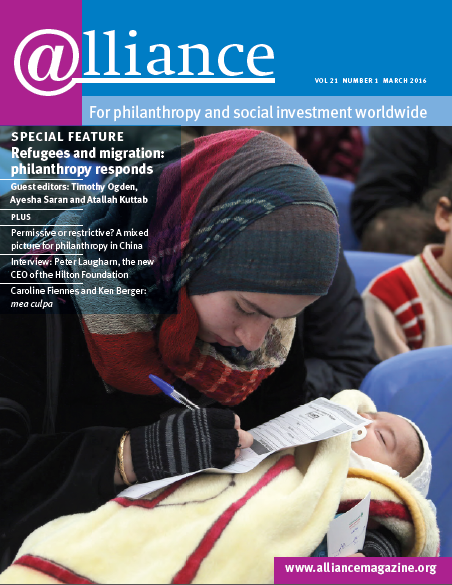Civil society organizations are well practised in using time and money for good. From now on, however, they also need to master using digital data and infrastructure. Like the other sectors of our societies, both commercial and governmental, the social sector needs to recognize its reliance on these resources and use them accordingly.
This is the key message of my seventh annual industry forecast, Philanthropy and the Social Economy: Blueprint 2016. For years I’ve been writing about how these changes were coming and the implications of their reach expanding. Well, from now on, I argue, civil society needs to simply assume them, recognize their influence, and adapt (or create new) practices accordingly.
Doing so will require new organizational practices. Digital data behave in ways that are basically different from time and money. For example, many people can use digital data at the same time; that’s what enables us to work simultaneously with colleagues on a ‘Google doc’. Digital data are also generative – every time we use them we create new data. Perhaps most significantly, digital data are unlike time and money in that they are abundant. The existing organizational practices and policies that shape current social sector action are all (rightly) built around an assumption of scarcity. But in an age of abundant, generative, replicable and reusable digital data, we need to rethink things.
The nature of digital data is one reason why personal privacy has become such an important issue. The personal data that we enter into websites, from names and addresses to emails or credit card numbers, are accompanied by the data that the platform we’re using generates, as we use it – what we clicked on, what time of day it was, how long we stayed and read the web pages. All of that information gets stored, somewhere. By someone. For some unknown period of time. And more data get added to it. And we hope that the someone storing it is protecting it, and that they’re not selling it without our permission or using it for research without telling us.
In civil society, that ‘someone’ is often a non-profit, a foundation or an association of members or peers. These organizations need to develop ways to use the digital data they collect – simply by having a website or a social media account, collecting donations electronically, or running online surveys – in ways that advance their mission and align with their values. And they need to manage and govern these digital resources with the same attention to detail and integrity that we expect when they manage their financial or human capital resources.
‘The practices for digital data management that work for a commercial company or government agency are not necessarily going to align with the mission of a domestic violence shelter, a human rights group, a disaster relief agency or a legal aid organization.’
Just how to do this is not entirely clear. Most important, the practices for digital data management that work for a commercial company or government agency – in other words the practices that are written about in business magazines and promoted in marketing materials – are not necessarily going to align with the mission of a domestic violence shelter, a human rights group, a disaster relief agency or a legal aid organization.
The new website DigitalImpact.io was created to help non-profits and foundations govern and use digital data ethically, safely and effectively. It offers organizations a set of peer-developed policies and tools for managing digital data. The materials are free, downloadable and customizable – designed so each organization can find what it needs and adapt it to align with its mission. DigitalImpact.io also provides background information on the nature of digital data, links to regulatory resources, and educational resources created specifically for non-profits and foundations.
Civil society is becoming increasingly digitally dependent. We need to make sure that it does so in ways that protect its core role as a separate sphere from government and business, and equip it with the tools it needs to thrive.
Lucy Bernholz is a senior research scholar at Stanford University’s Center on Philanthropy and Civil Society where she co-leads the Digital Civil Society Lab. Email lucy@lucybernholz.com







Comments (0)